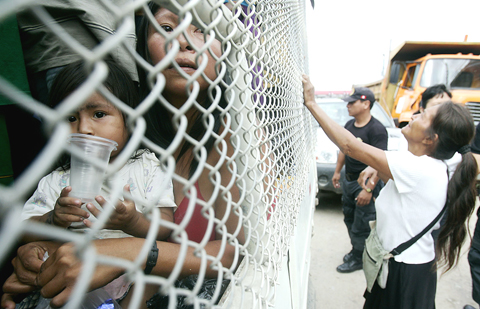A wanted leader of protesting Amazon Indians took refuge in Nicaragua’s embassy on Monday, Peru’s prime minister said, just days after violent clashes over land rights between Indians and police left 35 dead.
Demonstrations in northern Peru against Peruvian President Alan Garcia’s plans to ease restrictions on mining, oil drilling, wood harvesting and farming in the Amazon region erupted into violence on Friday and Saturday.
The clashes were the bloodiest in Peru since the government’s war in the 1980s and 1990s against the Shining Path, a violent Maoist insurgency, and the leftist Tupac Amaru guerrillas.

PHOTO: AP
“Barbarians!” screamed one of Lima’s tabloids, showing photographs of police killed by protesters wielding spears and machetes in Bagua, a mountainous jungle town about 1,000km north of Lima.
Indigenous communities, protesting for land rights, said the number of civilians killed in the 24-hour orgy of violence around Bagua was higher than the official count. The Peruvian media put the death toll at anywhere between 12 and 50. Twenty-four police officers were among those killed.
Peruvian Prime Minister Yehude Simon said late on Monday that Alberto Pizango — wanted on charges of sedition, conspiracy and rebellion — had taken refuge in the Nicaraguan embassy.
The Indian leader “has already taken asylum,” Simon told members of Congress.
Pizango, who was in the capital Lima when the violence in the city of Bagua broke out, spoke to reporters on Friday and accused Garcia of “genocide” and for “perpetuating the worst slaughter of our people in the last 20 years.”
However Pizango’s replacement, Daysi Zapata, was just as adamant that the protesters would continue the fight.
“We will never step back, we have not lost this struggle,” Zapata said at a press conference. “This government has stained our Peru with blood,” she said.
El Comercio, Peru’s newspaper of record, decried Garcia’s “monumental errors in the handling of the crisis” and pointed to “serious political responsibility.”
The “indifference” of Garcia’s center-right government “has compelled the [indigenous] movement” to radicalize, the paper said.
The episode recalled an assault on Shining Path rebels at Lima’s Castro-Castro Prison in 1992 that left 43 dead. Peru has tried to turn the page on the violence of previous decades, confident that its political stabilization and economic growth — at 9.8 percent last year — marked a new era.
But after the latest incident, which saw about 400 police move in to clear a road blocked by some 2,500 Indians, critics saw otherwise.
Amazon Indians have been protesting for nearly a year two decrees that Garcia signed in 2007 and last year opening jungle areas they consider ancestral lands to drilling for oil and timber.
For the National Organization of the Amazon Indigenous People of Peru, which represents some 600,000 people divided into 65 ethnic groups, the decrees violate a 1989 International Labor Organization convention on the rights of indigenous and tribal people.
The convention emphasizes the rights of native groups to be consulted and to participate in government action.

ANGER: A video shared online showed residents in a neighborhood confronting the national security minister, attempting to drag her toward floodwaters Argentina’s port city of Bahia Blanca has been “destroyed” after being pummeled by a year’s worth of rain in a matter of hours, killing 13 and driving hundreds from their homes, authorities said on Saturday. Two young girls — reportedly aged four and one — were missing after possibly being swept away by floodwaters in the wake of Friday’s storm. The deluge left hospital rooms underwater, turned neighborhoods into islands and cut electricity to swaths of the city. Argentine Minister of National Security Patricia Bullrich said Bahia Blanca was “destroyed.” The death toll rose to 13 on Saturday, up from 10 on Friday, authorities

Two daughters of an Argentine mountaineer who died on an icy peak 40 years ago have retrieved his backpack from the spot — finding camera film inside that allowed them a glimpse of some of his final experiences. Guillermo Vieiro was 44 when he died in 1985 — as did his climbing partner — while descending Argentina’s Tupungato lava dome, one of the highest peaks in the Americas. Last year, his backpack was spotted on a slope by mountaineer Gabriela Cavallaro, who examined it and contacted Vieiro’s daughters Guadalupe, 40, and Azul, 44. Last month, the three set out with four other guides

Local officials from Russia’s ruling party have caused controversy by presenting mothers of soldiers killed in Ukraine with gifts of meat grinders, an appliance widely used to describe Russia’s brutal tactics on the front line. The United Russia party in the northern Murmansk region posted photographs on social media showing officials smiling as they visited bereaved mothers with gifts of flowers and boxed meat grinders for International Women’s Day on Saturday, which is widely celebrated in Russia. The post included a message thanking the “dear moms” for their “strength of spirit and the love you put into bringing up your sons.” It

DISASTROUS VISIT: The talks in Saudi Arabia come after an altercation at the White House that led to the Ukrainian president leaving without signing a minerals deal Ukrainian President Volodymyr Zelenskiy was due to arrive in Saudi Arabia yesterday, a day ahead of crucial talks between Ukrainian and US officials on ending the war with Russia. Highly anticipated negotiations today on resolving the three-year conflict would see US and Ukrainian officials meet for the first time since Zelenskiy’s disastrous White House visit last month. Zelenskiy yesterday said that he would meet Saudi Arabian Crown Prince Mohammed bin Salman, the nation’s de facto leader, after which his team “will stay for a meeting on Tuesday with the American team.” At the talks in the Red Sea port city of Jeddah, US